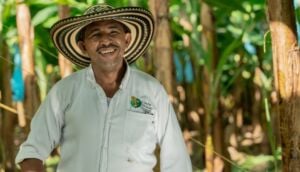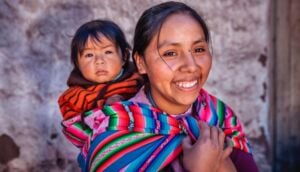Lack of access to finance remains one of the major barriers facing women entrepreneurs in marginalised communities across the world. 80 per cent of women-owned businesses with credit needs are either unserved or underserved – a US$1.7 trillion financing gap. CARE International is responding to this injustice by launching our ‘Access Approved’ campaign. We are calling on the financial sector to develop products and services that are specifically designed to meet the needs of marginalised women.
Women face all kinds of hidden barriers to accessing finance – just because they are women. Take Yeo Nakoni, a female vegetable farmer from the Ivory Coast: “I’ve worked this land now for 35 years, but the land doesn’t belong to me. In our community women don’t own land, it belongs to men.” This systemic inequality is then compounded when women try to access finances to grow their businesses: “When we go to the bank to ask for a loan, we’re denied because we have no collateral.”
Yet we know that women are a high value investment. Evidence shows that women are stronger savers than men, more responsible borrowers and calculated risk-takers. According to the Bank of New York Mellon, increasing women’s access to financial products and services could unlock $330 billion in annual global revenue.
By supporting women to save money, develop their business skills and access affordable loans, CARE has seen an astounding uplift in success rates. In Ethiopia, CARE has recently supported 5,000 women entrepreneurs in this way, resulting in an incomeincrease of 500%. At the start or the project 70% of the women had no savings and by the end, this had reduced to 3.6%. Through CARE’s partnership with a microfinance provider, many of the Ethiopian women were also able to access low-interest loans, which they are now successfully repaying.
Thanks to similar support from CARE, Yeo established a thriving savings group and through CARE’s partnership with another microfinance provider, Yeo was able to take out a low-interest loan of around 2,500 USD to expand her enterprise. She is now confidently repaying her loan and she is extremely proud of what she has achieved:
“Thanks to my fields I have been able to send my children to school and put food on the table. My fields have given me so many things, and a lot of strength. I am optimistic for my future. I see myself as a woman entrepreneur who makes decisions and contributes significantly to the expenses of her family. I see myself owning a home in five years and I know I am on the right track.”
Saving is a vital foundation for economic independence and CARE’s global flagship Village Savings & Loans Associations have directly supported nearly 7 million members across 45 countries over the past 25+ years. These VSLAs have created pathways for members to access loans and nearly 1 million members to open their first bank account.
Through the Access Approved campaign, women from Sri Lanka, Ivory Coast, Jordan and Peru share their stories on film for the first time, telling the banks what they think is needed to open up access to finance for women. These new films aim to bring the real issues to the fore, providing clear and personal recommendations to the financial sector:
- Jeanne from Ivory Coast says:“If banks would not focus on collateral or guarantees, and take a chance on women, we would emerge.” Watch Jeanne and Yeo’s film here
- Martha from Peru says:“It’s important for banks to create more services for women.” Watch Martha’s film here
- Bara’a from Jordan says:“If there were more women to decide on who gets a loan, things would be different.” Watch Bara’a’s film here
- Sarojini from Sri Lanka says:“It’s better when women are working at a bank. They understand us better.” Watch Sarojini’s film here
All these women participate in CARE’s Women in Enterprise Programme, supported by H&M Foundation, which has reached 133,000 women entrepreneurs globally since 2014. The programme shows that when women learn how to manage savings and have access to the right business skills training and financial services, they can successfully build their own enterprises.
Investing in women entrepreneurs is not just the right thing to do. It’s the smart thing to do. Women represent an enormous untapped market for financial institutions and we want to work with them to open up new opportunities. This makes business sense for both financial institutions and the women we support.










